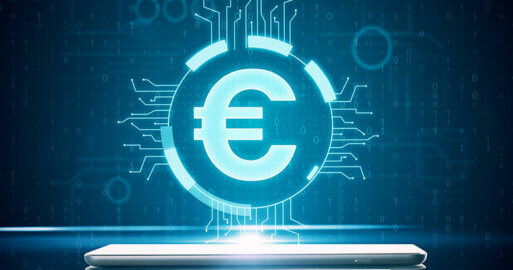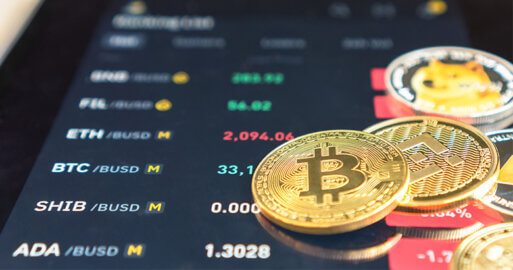The Future of Automation: Meaningful Blockchain Use in Digital Process Automation
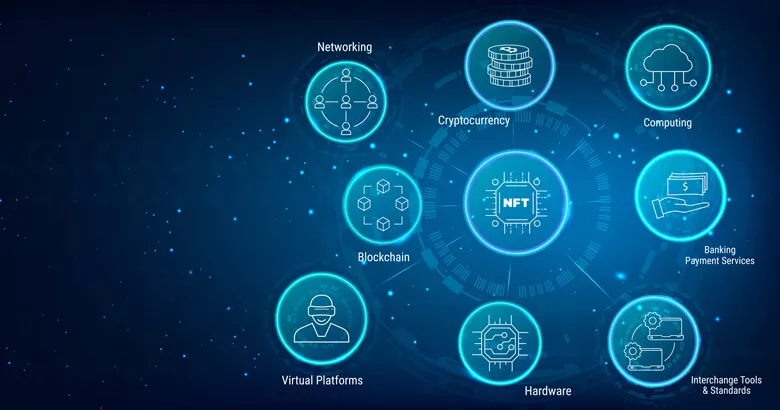
Once you start looking into topics like data processing, digitalization or automation, it doesn’t take long until you inevitably come across blockchain.
Whether we are already in a metaverse, and how far in, is not particularly clear to most of us yet. The same applies to all the associated big data, as well as concepts such as blockchain, NFTs and cryptocurrency. These are still a big area of uncertainty in our current projects. Nevertheless, development departments are grappling pretty intensively with blockchain. There’s a good reason for this, even if it does concern future digital process automation. We still have a number of unanswered questions here. In this article, we’ll be looking at some of the questions and sharing our perspective on the role of blockchain in digital process automation.
A quick guide to blockchain
Let’s start by defining a blockchain as it fits our purposes.
A blockchain is essentially a chain of blocks. This chain is constantly being extended with further blocks of data. Each block is time stamped and contains its transaction data and is cryptographically hashed with a secure checksum.
Initially, blockchain technology laid the technical foundation for cryptocurrencies. This provided an alternative approach to traditional financial transactions. Traditionally, a bank acts as a trusted intermediary in a financial transaction. As Deloitte Switzerland phrase it, in a blockchain ‟the intermediary is replaced by the collective verification of the ecosystem, which offers an extremely high level of verifiability, security and speed.”[1]
In short, the blockchain made it possible to conduct safe and secure transactions with cryptocurrencies.
Blockchain is developing at such a rate that its definition is also constantly evolving. So that we are all on the same page, let us base our understanding on this definition from Bitkom:
According to Bitkom[2], blockchain technology uses a distributed peer-to-peer network to securely process and validate data transactions. Blockchain belongs to the distributed ledger technology family and uses cryptographic procedures, consensus algorithms and back-linked blocks to secure transactions. Once a transaction is completed, it is essentially impossible to alter.
Before things get “too cryptic”, let’s take a look at how blockchain technology has evolved in recent years.
How does blockchain help the economy?
Blockchain technology makes it easier to fulfil and document regulatory requirements. This reduces compliance costs – a particular headache for the finance industry.
Supply chains are not only an important factor in production and transport. There are also contracts to sign, and blockchain technology would let you verify their authenticity. Last but not least, blockchain technology could let you conduct digital elections without worrying about electoral fraud.
Deloitte summarises the future possibilities inherent in blockchain:
‟The exponential, disruptive growth of blockchain is contingent on public and private blockchains converging into an ecosystem where companies, customers and suppliers can collaborate securely, traceably and virtually.”[3]
How is blockchain used?
Blockchain continues to be used a lot for cryptocurrencies. However, a survey by the Bitkom association shows that it is mainly larger companies that are looking at blockchain and related business models. 17% of companies with more than 500 employees say they already use blockchain. The technology has therefore been in the business world for a while now.
However, if we look at all the companies surveyed, the picture is a little different. Once we factor in the smaller companies, those with fewer than 500 employees, just 2% are using blockchain technology. Larger companies probably see more use cases as well as having a higher development budget at their disposal.
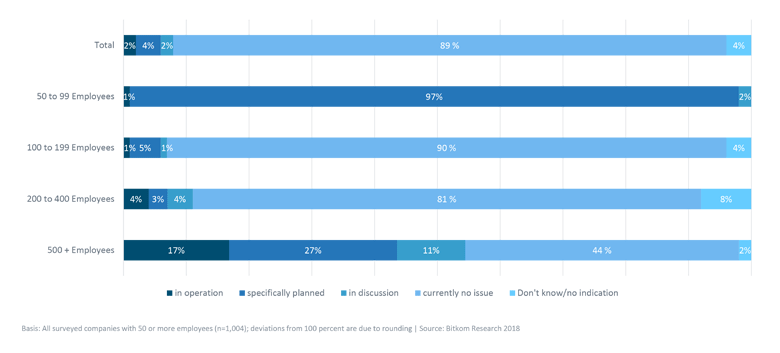
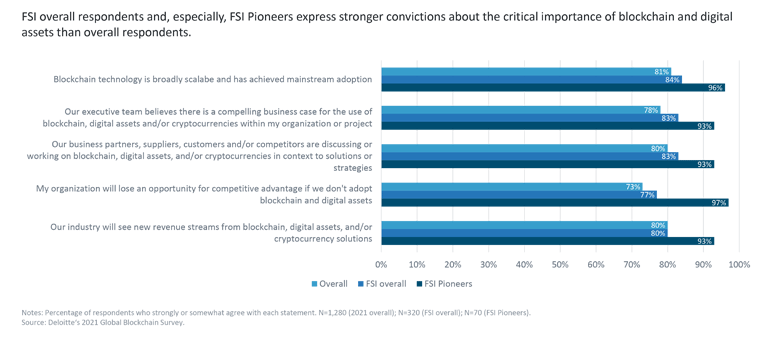
We can therefore see that blockchain technology is already being used in both the financial industry and other parts of the economy, especially in large organizations.
How can business and industry benefit from blockchain?
The main characteristics of blockchain make it particularly attractive for process automation.
- Blockchain works on a chain principle, data is not lost. Data blocks are linked together in a cohesive strand, with each new block building upon the previous block.
- Data is stored in a distributed way, with each party involved receiving a copy. Data loss is therefore not an issue.
- Reconciliation algorithms ensure that everyone is using the same chain.
- The cryptographic hashing used for blockchains is considered to be tamper-proof with current technologies. You therefore don’t need to be worried about falling prey to manipulation or an attempted attack.
- The data is encrypted, stored in a distributed network, and is absolutely confidential.
- The digital signatures are non-forgeable and make conflicts impossible.
According to a Bitkom survey looking at potential applications for blockchain technology[6], users consider the improvements in data quality and information security to be particularly beneficial. They also praised the fact that data can be validated decentrally in a large business ecosystem, while still being secure.
All of the above are extremely useful for the automated recognition, processing, checking and matching of data, as well as for transporting data between systems, people and infrastructures.
What challenges in process automation could be resolved with a blockchain?
In today’s process automation, data verification involves matching data against master data or external databases. Blockchain technology could enable more comprehensive and secure verification.
Furthermore, blockchain would let you check the authenticity of incoming documents such as contracts or delivery notes, and easily identify forgeries.
Essentially, blockchain technology lets you seamlessly trace the steps in any data transactions, with no further documentation of resources required.
What are possible use cases for blockchain?
In contract management, smart contracts are poised to play an ever larger role. Once a process automation platform starts interacting with a smart contract, it is also interacting with a blockchain. [7] A smart contract is essentially an automated contract, where coding on the blockchain only permits an action such as transfer of ownership to occur once a certain condition is met. Smart contracts are set to play an increasingly important role in the insurance market in particular, where they will complement conventional contract management.[8]
Loan applications mean a lot of work in the back office, especially at seasonal peaks. The usually manual effort this involves can be reduced with blockchain technologies. [9]
In any commercial process, it is important to comply with current regulations, and to be able to show this when audited. You can use blockchain technology to fully trace logistics processes for certain goods, and use this data in an audit. The ability to document a process from end to end using blockchain technology could be harnessed by many other industries. This will result in even more use cases in the future.
TCG works with SEEBURGER to offer a joint solution for automated invoice processing. This article describes a scenario in which blockchain could help make invoice processing even more secure and forgery-free.
What challenges do we need to overcome in blockchain?
There are some challenges and hurdles to overcome in introducing and using blockchain technology. As is the case when adopting any digital innovation, there are very high demands on IT and data security. There still needs to be some clarification on dealing with personal data, while external data and existing processes must be able to integrate smoothly and securely with blockchains.
At the same time, the performance required for blockchain use can often not be guaranteed in the real world. You cannot afford to wait to verify blockchain data.
Technological advances, such as in quantum technology, may compromise the current benefits of blockchain technology. For example, it is assumed that the quantum computers of the future will one day be able to decrypt cryptographic keys.
What’s next for blockchain?
As system integrators and software manufacturers, TCG Process GmbH and SEEBURGER are intensively involved with new technologies. Today’s new technologies are already expected to be old hat by tomorrow. Blockchain, for example, offers new possibilities in data reconciliation. Today’s matching with internal and external databases to verify data in the business process could be raised to a new level. Issues such as fraud or counterfeiting, or necessary steps in the supply chain, could be identified directly when incoming data is captured.
Would you like to know more about blockchain?
The blog article Blockchain or EDI in the Supply Chain? summarizes the various types of blockchain technology and how they can be used in the supply chain.
If you want to dig a little deeper, the blog article NFTs are taking the world by storm. But what is an NFT? looks at how blockchain is being used in new technologies and explains important terms and benefits.
Further concrete use cases and pilot projects often arise in exchanges with customers and partners. We look forward to hearing your ideas and perspective on blockchains and how we can develop together.
[1] Blockchain … erklärt in weniger als 100 Wörtern | Deloitte Schweiz, accessed 02.11.2022
[2] Faktenpapier Blockchain und Datenschutz (bitkom.org), abgerufen 02.11.2022
[3] Blockchain … erklärt in weniger als 100 Wörtern | Deloitte Schweiz, abgerufen 02.11.2022
[4] Blockchain in Deutschland – Einsatz, Potenziale, Herausforderungen | Bitkom e.V.
[5] Global Blockchain Survey 2021 | Deloitte Deutschland
[6] Blockchain in Deutschland – Einsatz, Potenziale, Herausforderungen | Bitkom e.V.
[7] Blockchain und Smart Contracts im Kontext der Prozessautomatisierung | SpringerLink
[8] BSI – Blockchain & Kryptowährung (bund.de)
[9] Private Blockchain: Prozessautomatisierung im Kreditgeschäft (it-finanzmagazin.de)
Thank you for your message
We appreciate your interest in SEEBURGER
Get in contact with us:
Please enter details about your project in the message section so we can direct your inquiry to the right consultant.
Written by: Sara Mazzorana
Sara Mazzorana is Marketing Manager at TCG Process GmbH. After completing her Bachelor's degree in Business Administration, Sara Mazzorana specialized further with a MA in "Entrepreneurship and Innovation" at the University of Bolzano. Sara Mazzorana joined TCG in Baienfurt near Lake Constance in 2018.
